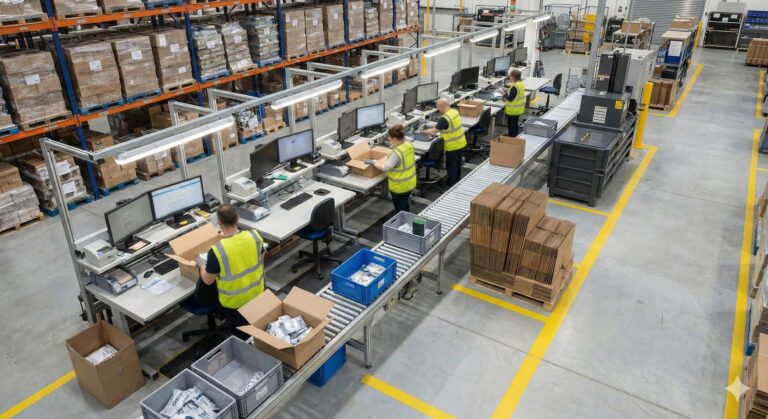Your brand’s reputation is the collective perception that customers, partners, and competitors have about your company. It’s shaped by every interaction, every product delivered, and every promise kept. We live in an interconnected world where information spreads rapidly and protecting your brand’s reputation is crucial.
Quality assurance is a vital tool for safeguarding your brand’s good name. A well-implemented quality assurance program ensures that your products or services consistently meet customer expectations, minimizing the risk of negative experiences that can harm your reputation. We’ll examine how quality assurance protects your brand, cultivates customer loyalty, and distinguishes your business in a competitive market.
Understanding Quality Assurance
Before we explore the impact of quality assurance on brand reputation, let’s first establish a clear understanding of what it entails. Quality assurance is often used interchangeably with quality control, but they are distinct concepts with different focuses.

What is Quality Assurance?
Quality assurance is a proactive, systematic approach to ensuring that products or services consistently meet or exceed customer expectations. It’s about preventing defects and errors before they occur, rather than simply detecting and correcting them after the fact. The core principles of quality assurance include:
- Customer Focus: Understanding and meeting customer needs and expectations.
- Interconnected Approach: Managing activities as interconnected processes.
- Continuous Improvement: Striving for ongoing improvement in all aspects of operations.
- Evidence-Based Decision Making: Using data and analysis to guide decisions.
- Team Engagement: Fostering a culture of quality involvement throughout the organization.
Quality Assurance vs. Quality Control
While both quality assurance and quality control aim to ensure product or service quality, they differ in their approach. Quality control focuses on inspecting and testing finished products or services to identify defects. Quality assurance, on the other hand, is a broader, preventive approach that encompasses the entire production or service delivery process. It aims to build quality into the process from the start, reducing the likelihood of defects occurring in the first place.
The Key Components of Quality Assurance
A robust quality assurance program involves several key components:
- Process Documentation: Clearly defined procedures and standards for all aspects of operations.
- Risk Assessment: Identifying and mitigating potential risks that could impact quality.
- Continuous Improvement: Regularly evaluating and refining processes to enhance efficiency and effectiveness.
- Training and Development: Equipping employees with the knowledge and skills to deliver high-quality work.
- Supplier Management: Ensuring that suppliers adhere to quality standards.
- Performance Measurement: Tracking and analyzing key performance indicators to monitor progress and identify areas for improvement.
By implementing these components, organizations can create a culture of quality that permeates every aspect of their operations, leading to improved customer satisfaction, enhanced brand reputation, and increased profitability.
The Impact of Poor Quality on Brand Reputation
While a single instance of poor quality might seem insignificant, its impact on your brand’s reputation can be far-reaching. Without extensive quality assurance, issues can quickly escalate, eroding customer trust and tarnishing your brand’s image.

Customer Dissatisfaction
When customers encounter a defective product or subpar service, it leads to dissatisfaction, which can result in negative online reviews, social media complaints, and a diminished perception of your brand. Because consumers heavily rely on online feedback, even a few negative comments can influence potential customers’ decisions and impact your brand.
Financial Losses and Legal Repercussions
The repercussions of poor quality extend beyond dissatisfied customers. Product recalls, lawsuits, and warranty claims can lead to substantial financial losses. These costs encompass:
- Expenses associated with recalling and replacing defective products
- Legal fees and potential settlements arising from lawsuits
- Costs related to addressing warranty claims and providing customer support
- Decreased sales resulting from a damaged brand reputation
Beyond the immediate financial impact, the long-term consequences can be detrimental. A tarnished brand image can break consumer trust, making it challenging to attract new customers and retain existing ones.
How Quality Assurance Protects Your Brand
By implementing a strong quality assurance program, you can not only prevent issues from reaching your customers but also cultivate a reputation for excellence that resonates with your target audience.

Preventing Defects and Errors
Quality assurance acts as an early warning system, identifying and rectifying potential problems before they impact your customers. Through rigorous testing, inspections, and process monitoring, quality assurance professionals proactively detect defects, errors, and inconsistencies. This early detection allows for timely corrective action, ensuring that only products or services of the highest quality reach the market. By preventing issues at the source, you avoid customer dissatisfaction, negative reviews, and the potential for costly recalls.
Enhancing Customer Satisfaction
Consistently delivering high-quality products or services is the cornerstone of customer satisfaction. When customers know they can rely on your brand to provide exceptional quality, they are more likely to become repeat buyers and loyal advocates. This loyalty translates into positive word-of-mouth recommendations, online reviews, and increased brand recognition. Customer experience is paramount in retail, and a strong quality assurance program can be a key differentiator, setting you apart from the competition and fostering lasting customer relationships.
Building Trust and Credibility
A comprehensive quality assurance program demonstrates your company’s unwavering commitment to excellence. It signals to customers, partners, and stakeholders that you prioritize quality and are dedicated to delivering products or services that meet or exceed their expectations. This commitment fosters trust and credibility, essential elements in building a strong brand reputation. When customers trust your brand, they are more likely to choose your products or services over those of your competitors, even in the face of price fluctuations or market changes.
Implementing Quality Assurance in Your Business
Implementing a quality assurance program requires a strategic approach that encompasses various aspects of your operations. It’s about setting clear standards, creating a well-defined plan, and leveraging the expertise of partners who can support your quality goals.

Defining Quality Standards
The first step in implementing quality assurance is to define clear and measurable quality standards for your products or services. These standards should be based on customer expectations, industry best practices, and regulatory requirements. By establishing specific, quantifiable objectives, you create a benchmark for evaluating performance and identifying areas for improvement. This clarity also ensures that everyone in your organization understands the expectations and works towards a common goal.
Developing a Quality Assurance Plan
Once you’ve defined your quality standards, the next step is to develop a comprehensive quality assurance plan. This plan should outline the specific processes, procedures, and tools that will be used to ensure that your products or services meet the established standards. It should also include provisions for regular monitoring, testing, and analysis to identify and address any potential issues. A well-structured quality assurance plan serves as a roadmap for your organization, guiding your efforts to achieve and maintain consistent quality.
Partnering with a 3PL
While you can certainly implement quality assurance measures internally, partnering with a third-party logistics (3PL) provider can bring significant advantages. A 3PL with expertise in quality assurance can offer:
- Specialized Knowledge and Resources: 3PLs often have dedicated quality assurance teams and access to advanced technologies and tools that can enhance your quality control efforts.
- Objective Assessment: A 3PL can provide an unbiased evaluation of your processes and identify areas for improvement that you might overlook internally.
- Scalability and Flexibility: As your business grows and evolves, a 3PL can adapt its quality assurance solutions to meet your changing needs.
- Cost Efficiency: Outsourcing quality assurance to a 3PL can be more cost-effective than building and maintaining an in-house team.
By collaborating with a 3PL like Hanzo Logistics, you can leverage their expertise and resources to strengthen your quality assurance program and ensure that your products or services consistently meet the highest standards.
Build Brand Trust Through Expert Quality Assurance Solutions
investing in quality assurance is not an expense; it’s a strategic investment in your brand’s future. By prioritizing quality, you’re not just protecting your reputation; you’re strengthening your relationship with customers, enhancing your competitive advantage, and paving the way for long-term success.
We’ve seen how a robust quality assurance program acts as a proactive shield, identifying and fixing issues before they reach your customers. We’ve also highlighted how consistently delivering high-quality products or services enhances customer satisfaction, builds trust, and sets you apart from the competition.
At Hanzo Logistics, we’re committed to helping businesses like yours achieve excellence through our quality assurance solutions. Our team of experts can work with you to develop and implement a customized quality assurance program that aligns with your specific needs and goals.



